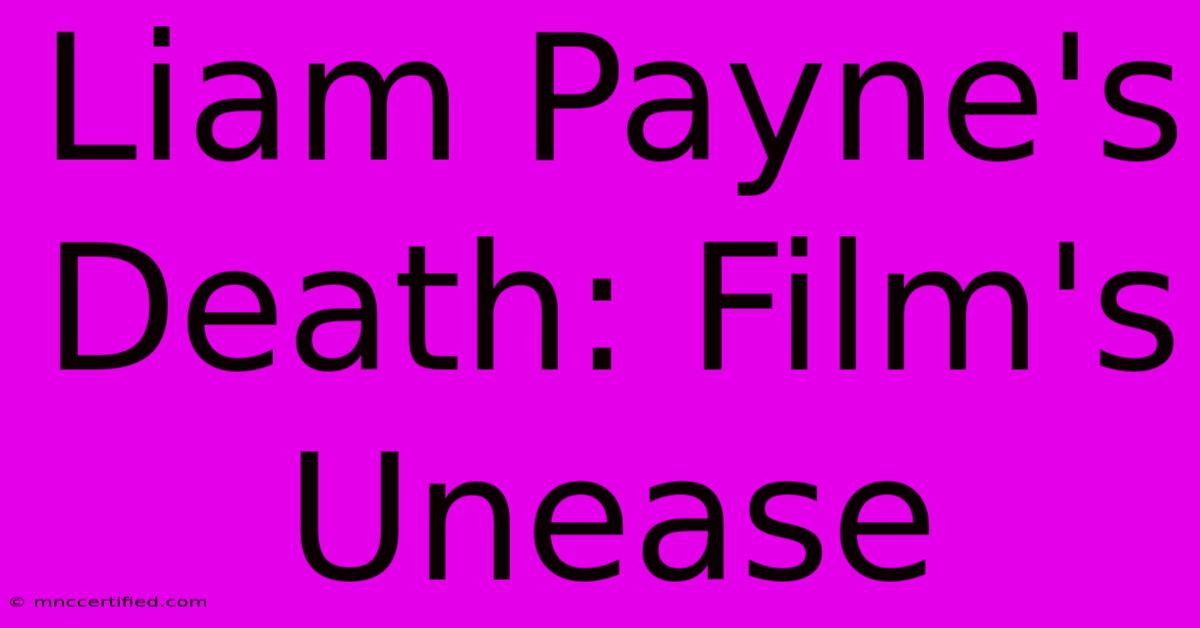Liam Payne's Death: Film's Unease

Table of Contents
Liam Payne's Death: Film's Unease – Exploring the Unsettling Speculation
The recent wave of speculation surrounding a supposed "Liam Payne's death" film has sparked considerable unease online. While no such film officially exists, the persistent rumors highlight a fascinating intersection of misinformation, celebrity culture, and the anxieties surrounding mortality in the digital age. This article delves into the unsettling nature of this fabricated narrative, examining its origins, spread, and the psychological impact of such false claims.
The Genesis of the Rumor: Misinformation in the Digital Age
The internet, a powerful tool for connection and information dissemination, is also a breeding ground for misinformation. The "Liam Payne's death" rumor, likely originating from a hoax or a poorly-sourced article, rapidly gained traction through social media platforms. The speed and ease with which false information spreads online, often fueled by sensational headlines and a lack of critical evaluation, underscores the vulnerability of the digital landscape to manipulated narratives. This incident serves as a stark reminder of the importance of verifying information before sharing it, especially when it involves sensitive topics like the death of a public figure.
The Psychological Impact: Fear, Grief, and the Commodification of Death
The anxiety surrounding the fabricated Liam Payne death rumor reveals a deeper unease. The intense emotional response from fans, even in the face of its falsity, showcases the powerful connection between celebrities and their audiences. This connection, while positive in its genuine expressions of admiration, can be easily exploited by misinformation campaigns. The manufactured grief and fear associated with such rumors highlight the problematic commodification of death in the digital sphere, where sensationalism often trumps accuracy and sensitivity.
Analyzing the "Film" Narrative: A Closer Look at the Fiction
The core of the unease stems from the purported existence of a film detailing Liam Payne's death. This non-existent film acts as a focal point for the rumor, amplifying its impact. The speculation itself creates a narrative vacuum, filled by imaginative and often disturbing interpretations. The lack of concrete evidence surrounding this hypothetical film further intensifies the feeling of uncertainty and fuels the rumor mill. This points to a broader issue: the power of narratives, both true and false, in shaping our perception of reality, particularly in the context of celebrity culture.
Combating Misinformation: Critical Thinking and Responsible Reporting
The "Liam Payne's death" saga underscores the crucial role of critical thinking in navigating the digital world. Verifying information from reliable sources, questioning the credibility of sensational headlines, and promoting responsible media consumption are essential steps in combating the spread of misinformation. News organizations and social media platforms also bear a responsibility in curbing the proliferation of false narratives, particularly those involving the death of public figures.
Conclusion: The Lingering Unease and the Need for Media Literacy
The unease surrounding the fabricated "Liam Payne's death" film highlights the vulnerability of the digital age to misinformation and the significant psychological impact of false narratives. It serves as a potent reminder of the importance of media literacy, responsible reporting, and critical thinking in navigating the complexities of the online world. The persistent nature of this rumor emphasizes the need for greater awareness and proactive measures to combat the spread of such harmful misinformation. Ultimately, this incident should serve as a cautionary tale, urging us to approach online information with skepticism and a healthy dose of critical evaluation.

Thank you for visiting our website wich cover about Liam Payne's Death: Film's Unease. We hope the information provided has been useful to you. Feel free to contact us if you have any questions or need further assistance. See you next time and dont miss to bookmark.
Featured Posts
-
Commercial Auto Insurance Nebraska
Nov 17, 2024
-
Snow In Wales Met Offices Date Forecast
Nov 17, 2024
-
Washington County Health Insurance
Nov 17, 2024
-
Deion Sanders Fetch Wont Happen
Nov 17, 2024
-
Autumn Rugby Englands Score Against South Africa
Nov 17, 2024